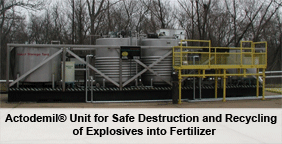ActodemilÂŽ: The Solution to Munitions Waste Disposition
Energetics - Chemical Agents - Biological Agents
SAFE:
Permanently Destroys Energetics, Chemical and Biological Agents
ENVIRONMENTALLY SOUND:
Non Polluting and Non Hazardous Product
COST EFFECTIVE:
Lower Cost Than Thermal Destruction Methods Recycles Energetic Into Saleable Fertilizer
A CLEAR CUT ALTERNATIVE TO INCINERATION AND OB/OD.
Actodemil is a breakthrough approach for the safe destruction of a variety of explosive chemicals. US environmental regulations mandate the phasing out of the current approach of open burning and open detonation. The United Nations prohibits ocean dumping of munitions. Stockpiled munitions are obsolete because they either are unusable or unstable. The US Army has a major demilitarization program to safely dispose of almost 600,000 tons of obsolete munitions. All the major countries have large obsolete stockpiles and seeking safe and environmentally benign approaches for disposition.
Actodemil technology is successfully being deployed for the U.S. Army for recycling of explosive component from munitions into fertilizer. The US Environmental Protection Agency regulations accept this approach as recycling of negative assets into value added useful products. The use of humic substances in this niche market presents an opportunity to create useful applications for coal derived humic substances.
 A unit has been deployed to the McAlester Army Ammunition Plan in McAlester, Oklahoma. Actodemil was also successfully demonstrated at Hawthorne Army Depot in Nevada. The US Army estimates it will save almost $500 million from not having to retrograde large amounts of obsolete munitions now stored in Korea. The US Army is building Actodemil facilities at Crane Army Depot in Indiana and Radford Ammo Plant in Virginia. A novel non-thermal environmentally friendly Actodemil unit for decontamination of shells with TNT residue has been installed for the Egyptian Army demil facility at Haikestep, near Cairo.
A unit has been deployed to the McAlester Army Ammunition Plan in McAlester, Oklahoma. Actodemil was also successfully demonstrated at Hawthorne Army Depot in Nevada. The US Army estimates it will save almost $500 million from not having to retrograde large amounts of obsolete munitions now stored in Korea. The US Army is building Actodemil facilities at Crane Army Depot in Indiana and Radford Ammo Plant in Virginia. A novel non-thermal environmentally friendly Actodemil unit for decontamination of shells with TNT residue has been installed for the Egyptian Army demil facility at Haikestep, near Cairo.
The Actodemil technology has also been demonstrated for converting nitrocellulose into fertilizer for a major US company. The resultant fertilizer was successfully applied to corn crops in New Jersey with a substantial increase in yield. Our researchers have achieved a major technological breakthrough for the complete destruction of highly toxic ammonium perchlorate, the primary component in missiles, whose shelf life have expired and must be disposed off in environmentally safe manner.
Fertilizer made from several propellants and explosives has been found to be in compliance to the rigorous U.S. Environmental Protection Agency Universal Treatment Standards for Hazardous Wastes. This recycled fertilizer is used by farmers who are reporting increased crop yields for corn, soybeans, and fodder grasses.

